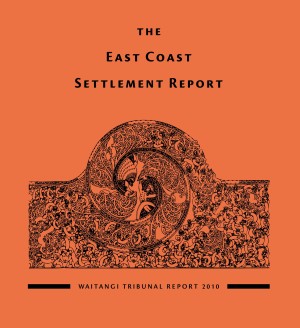East Coast Settlement Report released

The East Coast Settlement Report is the outcome of an urgent Waitangi Tribunal hearing held in Wellington between 14 and 16 December 2009 into the Crown's recognition of Te Runanga o Ngāti Porou's (TRONP) mandate to negotiate and settle all historical Ngāti Porou Treaty of Waitangi claims. The Tribunal panel comprised Judge Craig Coxhead (presiding), the Honourable Sir Douglas Kidd, Kihi Ngatai, Tania Simpson, and Basil Morrison.
The three main claimants in the inquiry asserted they represented Ruawaipu, Uepohatu, and Te Aitanga-a-Hauiti. All submitted that they, and those they claimed to represent, were not Ngāti Porou, and TRONP therefore had no valid mandate to represent them in settlement negotiations. The claimants argued that the Crown's mandating process was flawed and sought a recommendation that the Crown delay the Ngāti Porou settlement negotiations until their historical claims had been inquired into by the Waitangi Tribunal.
TRONP, as a secondary party to these proceedings, argued that those identifying as Ruawaipu, Uepohatu, and Te Aitanga-a-Hauiti were Ngāti Porou. The Crown submitted that TRONP had a valid mandate to negotiate all Ngati Porou historical claims within the East Coast inquiry district. The Tribunal did not inquire into matters of tribal identity but instead focused on the actions of the Crown in recognising TRONP's mandate.
Having assessed the evidence and arguments of all parties, the Tribunal did not recommend that the Crown delay settlement with TRONP as requested by the claimants. The Tribunal concluded that the potential prejudice of delaying such a significant settlement would outweigh any possible prejudice to the claimants from having their claims settled without their specific consent. The Tribunal was also not convinced that the claimants commanded significant support compared with the support demonstrated by TRONP. The Tribunal was mindful of the fact that both the Crown and TRONP had suggested ways in which at least some of the claimants' concerns might be addressed.
However, the Tribunal also noted flaws in the process followed by the Crown in recognising TRONP's mandate. While the Tribunal did not consider that these flaws were so serious as to warrant recommending delaying settlement, it was concerned that they should not be repeated when the Crown seeks to negotiate and settle Treaty claims with other groups. The Tribunal therefore recommended a number of changes to the Crown's mandate policies to enhance the durability of future settlements. The Tribunal urged the Crown to adopt these recommended changes and to ensure they are reflected in official documents outlining Crown settlement policy. These recommended changes included the following:
- OTS should call for submissions at the point that a proposed mandating strategy is submitted, as well as after a deed of mandate is received. This will allow claimants who have a vested interest in a settlement ample time to comment upon, oppose, or make recommendations on the strategy, as well as to inform the Crown of interested parties and allow it the opportunity to engage with them at an early stage in the process.
- The information provided as part of any mandating strategy must include:
- the specific claims (Wai numbers) to be included in a proposed settlement;
- a clear definition of the claimant community on an iwi, hapu, marae, and whakapapa basis; and
- the specific geographical area to be covered by a proposed settlement.
- OTS should, at an early stage, write to all Wai number claimants whose claims might be extinguished if a proposed settlement goes ahead, informing them of this fact. The earlier in the process claimants know what is being proposed, the earlier they can support or oppose negotiations. Furthermore, the Crown could insist that the negotiating committee formed after the mandating process inform all those affected by the proposed settlement on a regular basis when milestones are reached in its negotiations with Crown officials.
- The Crown should adopt a more proactive role in monitoring developments during the mandating strategy process. While we understand and acknowledge the Crown's reluctance to intervene in disputes over which claims are to be included in a mandating strategy, it also has a responsibility towards claimants who may feel marginalised as a result of the process.
- The Crown has a responsibility to ensure that all interested parties in a negotiated settlement have access to unhindered participation at every stage of the mandating process. This will lessen the likelihood of claimants seeking recourse to urgency proceedings with the Tribunal and ensure that settlements are conducted in a fair and open manner.
- OTS should update its policy guide, 'Ka Tika a Muri, Ka Tika a Mua', to reflect changes that have arisen out of the recommendations of the 'Te Arawa Settlement Process Reports' and the 'Tamaki Makaurau Report', as well as the recommendations of the present inquiry.
Read the East Coast Settlement Report [PDF, 1.1 MB]
For media inquiries, contact the Ministry of Justice media centre(external link)